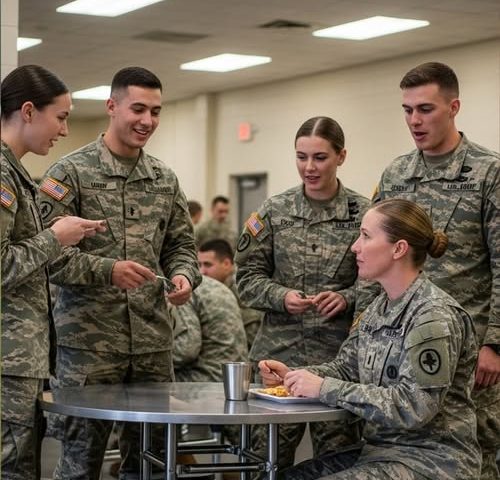Silent Strength at Table 43
Commander Evelyn “Eve” Reed sat alone at a small metal table in the corner of the Fort Bragg mess hall, quietly eating a bowl of chili that had long since gone cold. At 47, she looked like any middle-aged officer waiting for a paperwork assignment—hair tightened into a bun, uniform crisp, posture calm.
Nothing about her appearance invited attention.
And yet, every person who glanced her way felt something they couldn’t explain. A presence. A steadiness. A gravity.
Reed had spent 25 years carrying responsibilities she could never talk about—missions that lived in files locked behind blast doors, decisions that kept entire units alive, and scars that disappeared beneath her collar but never fully healed.
Today, she wanted nothing more than silence.
But silence is rarely granted to people who’ve earned it.
The Recruits Who Saw the Wrong Thing
Four soldiers—newly promoted, flush with confidence—spotted Reed sitting alone and mistook her solitude for weakness.
- Staff Sergeant Marcus “Mac” Allen, 22, energetic and loud.
- Private First Class Trevor “Tank” Jones, younger, broad-shouldered, and eager to impress.
- Specialist Rhonda “Ronnie” Bell, observant but loyal to the wrong leader.
- Private Samuel Cooper, nervous, constantly one step behind the others.
They assumed Reed was the easy target in the room.
A harmless older woman.
A quiet administrative officer.
Someone who would give up her table without resistance.
What they didn’t know—what they couldn’t know—was that Commander Reed had once led units in environments so unforgiving that survival itself was a statistic.
You don’t see that written on a uniform.
A Storm Gathering Without Thunder
Reed felt them before she heard them—four sets of footsteps approaching with purpose, with assumptions, with youthful impatience.
She didn’t look up.
She didn’t react.
She simply continued to eat, eyes lowered, breath steady.
Across the room, Chief Warrant Officer Elias Vargas kept a discreet eye on the situation. Vargas knew her file. Knew her background. Knew that if she was forced to stand up, the mess hall would never forget this day.
Reed wasn’t avoiding conflict.
She was calculating.
Measuring risk.
Choosing restraint.
Her heart rate did not lift above a resting 62 beats per minute.
Lines Crossed and Lessons Ignored
Mac approached first, wearing a smirk sharpened by too many compliments and too little wisdom.
“Ma’am,” he said in a tone that wasn’t respectful, “we need this table.”
Reed didn’t lift her gaze.
Tank stepped forward, placing a large hand on the back of the chair beside her—an unspoken demand.
Ronnie watched closely, uncertain.
Sam shifted nervously, sensing trouble.
The silence stretched thin.
Too thin.
Reed finally lifted her eyes—calm, steady, colder than winter on the tarmac.
“You don’t want to continue this,” she said softly.
Mac laughed. “Or what? You’ll report us?”
Reed simply blinked.
And that was the moment the line was crossed.
The 45 Seconds Everyone at Fort Bragg Would Remember
What happened next unfolded with such controlled precision that no one could keep up—not even Vargas, who had spent years watching her work.
There were no raised voices.
No uncontrolled strikes.
No chaos.
Only movement—fluid, deliberate, impossibly fast—and choices made with absolute restraint.
The mess hall went silent.
Chairs shifted.
Metal clattered.
Voices cut off mid-sentence.
In less than one minute, the situation ended as quickly as it began—each recruit realizing, with dawning clarity, that they had misunderstood everything.
When it was over, Reed stood exactly where she had started—calm, composed, as though she had simply risen to refill her water.
No one spoke.
Even the air seemed to freeze.
Revelation in the Quiet Aftermath
Vargas stepped forward at last.
“Commander Reed,” he said loudly—intentionally—“your transfer orders came through.”
The room inhaled sharply.
Commander.
Not “ma’am.”
Not “officer.”
Commander.
And then he placed something in her palm: a military challenge coin engraved with symbols most personnel in that room had only ever heard whispered about.
A hush washed over the mess hall.
Ronnie’s eyes widened.
Sam swallowed hard.
Tank stared in shock.
Mac’s face drained of color.
Because they finally understood—
They hadn’t challenged a clerk.
They hadn’t challenged an administrator.
They had challenged someone whose career existed behind layers of sealed files and redacted sentences.
Someone who trained people who trained elite units.
Someone who survived missions most never returned from.
Someone dangerous not because she was violent—
but because she was disciplined.
The Lesson They Would Never Forget
Mac finally stammered, “Commander… we didn’t know.”
Reed’s voice remained soft—but carried enough weight to anchor an entire room.
“You don’t get to know who people are just by looking at them,” she said. “Out there, assuming weakness can cost you more than embarrassment—it can cost lives.”
She turned her gaze toward Sam, the youngest, the one who hadn’t wanted any of this.
“Choose your company,” she told him quietly. “And choose it wisely.”
No anger.
No revenge.
Just truth delivered with clarity sharp enough to change futures.
Why the Story Matters
When Reed left the mess hall, no one saw an ordinary woman anymore.
They saw someone who had mastered calm under pressure.
Someone who chose restraint over pride.
Someone whose strength lived in her silence, not her noise.
Her legacy that day wasn’t the 45 seconds people whispered about.
It was the message she left behind:
“Respect everyone. Fear no one. And never underestimate someone whose strength you cannot see.”
A week later, Fort Bragg would quietly circulate an internal training memo titled:
The Reed Protocol: De-Escalation, Professional Conduct, and the Cost of Assumption
Every soldier attended.
Because after that day, no one forgot:
The quietest person in the room may be the one who once held the line when no one else could.
And sometimes, the person eating alone is not alone at all—
they’re simply giving the world a chance to be better than their expectations.
